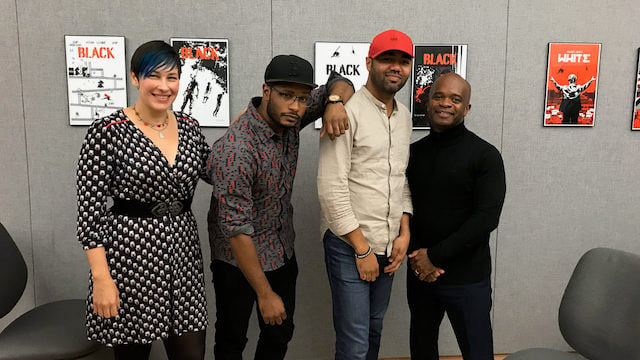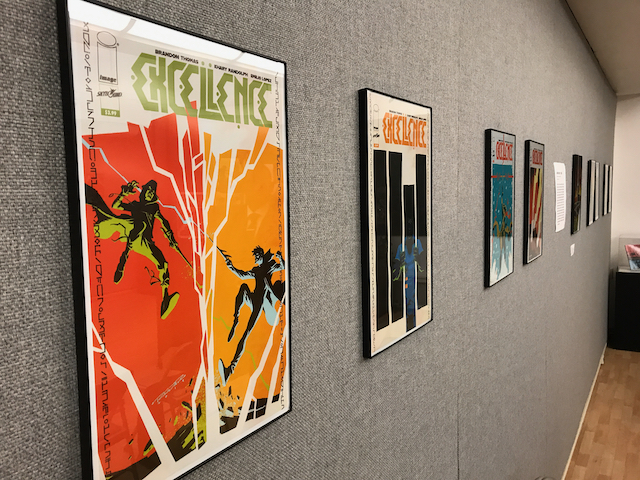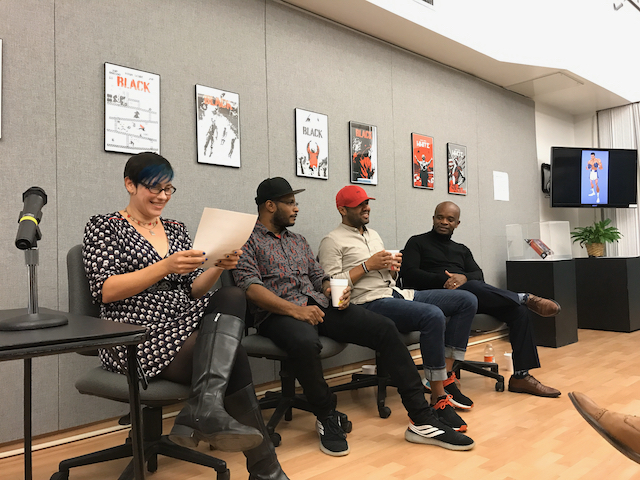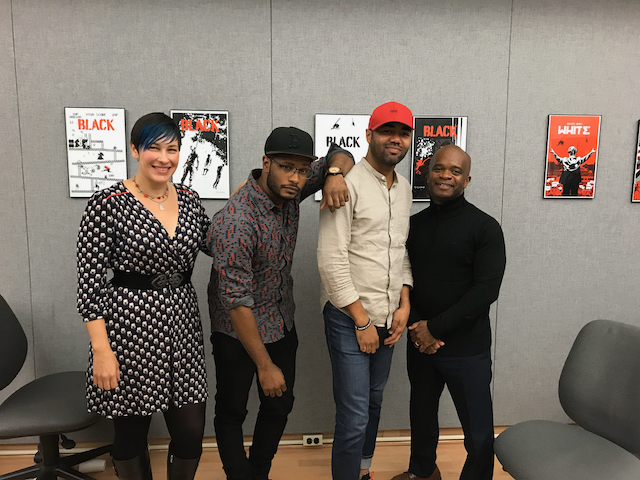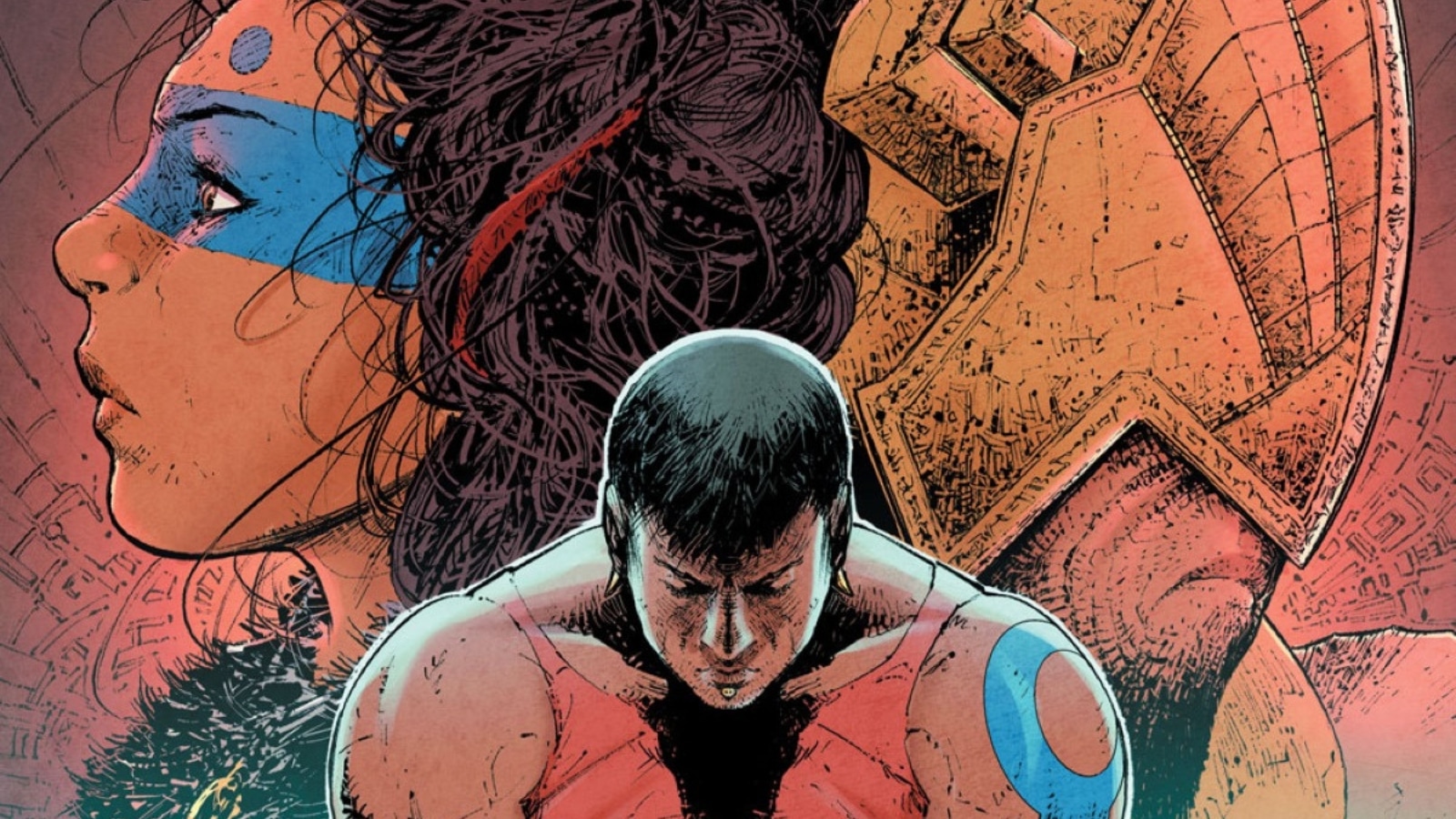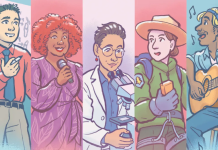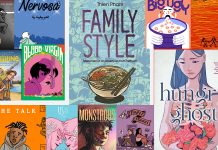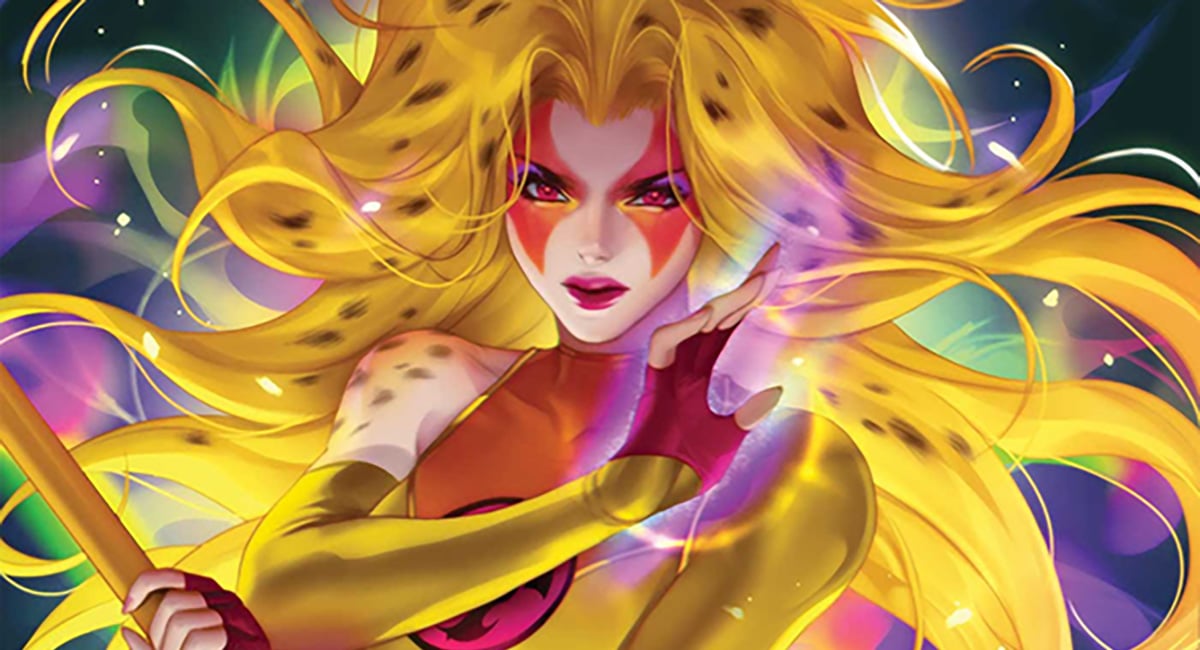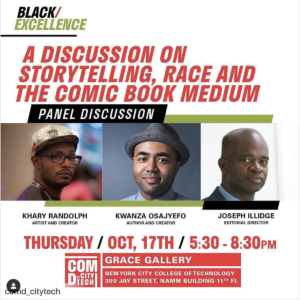
[For #BlackOutTuesday The Beat is reposting content that spotlights black voices and issues – originally posted 10/18/19.]
If you missed any of the panels at NYCC that dealt with diversity in comics, on Thursday evening the Department of Communication Design’s Grace Gallery at New York City College of Technology held a panel discussion on “Race, Storytelling and the Comic Book Medium.” Moderated by creator and Assistant Professor Sara Woolley, artist and creator Khary Randolph, writer and creator Kwanzaa Osajyefo, and A Wave Blue World Editorial Director Joseph P. Illidge had a frank and open discussion on race in comics and in real life.
An outgrowth of the current exhibition spotlighting Randolph’s work in comics, some of which was done in conjunction with Osajyefo and Illidge, these gentlemen collectively have over 40 years of comic publishing experience and they shared these experiences with the attendees. They started with recounting their personal journeys as comic readers: Randolph was a fan of Image Comics, Osajyefo started off with Charlie Brown, and Illidge started reading comics in the second grade. As for breaking into the industry, they all were earnest in the fact that their trajectories were unplanned.
Illidge broke down the job of an editor: “I was like a lot of kids I grew up thinking I wanted to be a comic book artist, I’ve been drawing since I was a kid. That didn’t work out, but then I thought I’d write comics. I kept sending in these submissions; nothing was happening, because that’s not the way it works, but you don’t know that when you come out of college. When I went to work at Milestone I started in the business department, because I thought I would like to have my own company, and I thought I would need to know how it works.”
“But then when I was there, one of the founders Dwayne McDuffie — Rest in Peace to him — not only was he an amazing writer and brilliant man, he was the Editor-in-Chief and he showed me what being an editor was,” Illidge continued. “This was a credit that I always saw in comics and it was this annoying thing that you pass by. I didn’t care what an editor was; all I cared about was who wrote, who drew it and maybe who the colorist was.”
Illidge explained that McDuffie taught him what an editor does: “In addition to making sure that the work comes out on time, in addition to making sure that it maintains a standard of quality, a job of an editor is to help all the creators be the best creators that they can be. Help the writer be the best, help the artist be the best, and to remind us all that story is the most important thing. We’re all fueled by our egos. Egos are what get us up in the morning, what make us want to be better than the day before, but story is the thing to which we must all be the servant. Knowing that, I was like, ‘Wow, there is a purpose here.’ That was the beginning of my editorial career and that’s what I still do today. It’s about helping creators be the best that they can be and all of us finding our way to the best story.”
When asked about the importance of authenticity in their work, Randolph gave an example of the importance of having eyes on a project that don’t belong to just straight white men.
He said, “I feel as though I can’t just represent Black people, I’ve got to represent for everybody, so that comes in certain ways. I was brought onto a book a couple of years ago, and the writer wrote a scene where he wanted to portray some Latin teens in New York City, riding around Queens in a lowrider. They were using West Coast slang and I was like, ‘That’s not New York. I’m not Hispanic myself, but I have enough friends that I know this slang is wrong.'”
He continued, “I went to a Puerto Rican friend of mine, was like, ‘Yo, how would people say this?’ He went through the entire script and he was like, ‘They would never say this. Put this in; take this out.’ I went to my editors and [said], ‘Let me tell you why all of this is wrong and let me fix that.’ And that was one of those things [where I realized] I just can’t rep this; I got to rep something bigger than this, because a lot of people don’t get these opportunities.”
As for the young creators in the room who are just beginning their careers in comics, Osajyefo dropped some gems, including, “If you’re working on something you should also be studying constantly, reading other people’s stuff, taking classes, refining your craft, always trying to improve. You’re in a much better position than when we started.” He explained, “I came up with the idea for Black 10 years ago. Part of the reason why I didn’t do it then was it was just a different era. We didn’t have things like Kickstarter then; we didn’t have social media where we could elevate the idea and it could go viral and capture attention; that’s a different landscape.”
“I’m very much more the independent route if you have an idea or a story that’s in you,” Osajyefo continued. “You now have many more avenues for getting that story out there, getting it in front of people, connecting and finding an audience. I would say, when you feel like you’re ready, just put it out there — and if you stumble, that’s a good thing.”
Trying with the potential of failing is important, he said. “When Black came out, that was literally going to be my test for the concept. I was like, ‘Cool, Kickstarter make sense; if it’s a stupid idea, we won’t make any money and I’ll know to give this up, this is dumb.’ But it went the other way and I was like, ‘Oh, we must be onto something here,'” Osajyefo said. “That is a much different landscape than just going to conventions, getting an agent and pitching to a publisher. I don’t want to say you don’t have to do that, just there’s more than one avenue. There are many ways that you can get your story out there.”
For me, the biggest take away from this panel was understanding your worth. Besides self-care, the panelists all emphasized understanding the value we place on ourselves financially and creatively. If you don’t want to miss any more informative talks like this or if you want more of the panelists’ insights, follow them on Twitter: Sara Woolley, Khary Randolph, Kwanzaa Osajyefo, and Joseph P. Illidge.


